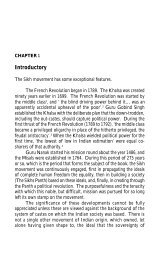Fundamentalism and the Sikh Religious Tradition by T.N. Madan
Fundamentalism and the Sikh Religious Tradition by T.N. Madan
Fundamentalism and the Sikh Religious Tradition by T.N. Madan
You also want an ePaper? Increase the reach of your titles
YUMPU automatically turns print PDFs into web optimized ePapers that Google loves.
fostered throughout history". The report, King feels, "should be analysed as a momentous<br />
call to explore <strong>the</strong> powers of religion <strong>and</strong> spirituality in shaping <strong>the</strong> world. The Club of<br />
Rome is not alone in doing this; <strong>the</strong>re are many o<strong>the</strong>r voices today which stress <strong>the</strong> same<br />
point."<br />
It is because of a known <strong>and</strong> felt chaos that, whe<strong>the</strong>r it is <strong>the</strong> Club of Rome, <strong>the</strong><br />
Churches of North America, <strong>the</strong> Liberation Theologians, a Niebuhr, a Moltmann, a<br />
Fa<strong>the</strong>r C. Torres, Archbishop H. Camara, a N.T. Sehgal, a Schumucher or a<br />
Schervanadze, <strong>the</strong>y plead for a universal ethics that alone can help us in <strong>the</strong> present moral<br />
crisis, <strong>and</strong> can alleviate <strong>the</strong> sufferings of our 'individualaistic' <strong>and</strong> 'consumer generation'.<br />
It is, <strong>the</strong>refore, time that we thought about <strong>the</strong> current situation in <strong>the</strong> country<br />
<strong>and</strong> <strong>the</strong> world, more patiently, more seriously <strong>and</strong> less self- righteously. Both World<br />
Secularism <strong>and</strong> Indian Secularism are having <strong>the</strong>ir problems, which are serious enough.<br />
We wonder, if merely attributing <strong>the</strong>m to <strong>Fundamentalism</strong> or calling <strong>the</strong> prophet of<br />
ano<strong>the</strong>r religion a Fundamentalist, a comdemnatory word in <strong>the</strong> present political jargon,<br />
will be a worthwhile academic solution or an appropriate contribution in any way<br />
relieving <strong>the</strong> current situation. It would seem that atleast from <strong>the</strong> academic world a<br />
sounder appraisal of <strong>the</strong> events is called for. <strong>Sikh</strong>ism has never been exclusive. In tune<br />
with its goals, it has always been willing <strong>and</strong> anxious to cooperate with any ideology or<br />
system that has universal goals or ends to achieve.<br />
The need of <strong>the</strong> times, we believe, is to bring into contact <strong>and</strong> cooperation all<br />
those forces that exist in every field of life to make for universal underst<strong>and</strong>ing <strong>and</strong><br />
effort. The cultural problems today are global <strong>and</strong> serious. The Cartesian individualism<br />
has increasingly divorced us from <strong>the</strong> basic stream <strong>and</strong> rhythm of life, which is <strong>the</strong> source<br />
of all values. We owe it to ourselves, <strong>the</strong> society <strong>and</strong> <strong>the</strong> world that we contribute towards<br />
social effort <strong>and</strong> sustenance, instead of to division <strong>and</strong> decay. In India we need to do<br />
some heart searching. Have we in <strong>the</strong> last about half a century improved for posterity <strong>the</strong><br />
legacy of India we received from our forefa<strong>the</strong>rs ?<br />
REFERENCES AND NOTES<br />
1. Wilson, H.H„ Relipous Sects of Hindus, p. 19.<br />
2. Briggs, G.W., Gorakh Nath <strong>and</strong> Kanphatta Yogis, pp. 26-27 & 45.<br />
3. Ibid. p. 28.<br />
4. Jain N.K., <strong>Sikh</strong> Gurus <strong>and</strong> Indian Spiritual Thought, p. 168, Punjabi University,<br />
Patiala.<br />
5. Jaiswal, Savir, The Origin <strong>and</strong> Development of Vaishnavisin, p. 116-118,<br />
6. G.Murthy, H.V.S., Vaistmavism of Shankradeva <strong>and</strong> Ramanuja, p. 232.<br />
7. Zimmer, H., Philosophies of India; pp. 222-23.<br />
8. Daljeet Singh, <strong>Sikh</strong>ism- Sterling Publications Pvt. Ltd., New Delhi, 1979; p. 95 Journal<br />
of <strong>Sikh</strong> Studies, Vol. 7, Feb-Aug. 1980; GND University, Amritsar; p.38.<br />
9. Ibid., Journal of <strong>Sikh</strong> Studies, Vol. 7, Feb-Aug. 1980, GND University Amritsar, p. 38.<br />
10. Juergensmeyer, M. <strong>and</strong> Barrier, N.G., <strong>Sikh</strong> Studies, Berkley <strong>Religious</strong> Studies Series,<br />
Graduate Theological Union, Berkley, 1979, p. 83.<br />
11. Machve, P., Quoted <strong>by</strong> Daljeet Singh; The <strong>Sikh</strong> Ideology; Guru Nanak Foundation,<br />
New Delhi, 1984, pp. 111-2.<br />
12. Murthy, H.V.S., Vaishnavism of Shankradeva <strong>and</strong> Ramanuja, p. 201-2.<br />
13. Maitra, S.K., The Ethics of Hindus, p. 244.<br />
14. Zaehner, R.C., Mysticism : Sacred <strong>and</strong> Profane; p. 155.
















